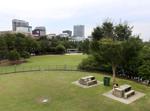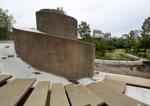COLUMBIA — State tax revenue could go toward cleaning up Columbia’s parks instead of to the local tourism groups it usually funds, council members proposed at a July 26 work session.
Using another pot of funds from hospitality tax revenue, members also proposed creating a workshop to help local nonprofits learn how to fundraise and apply for grants to help keep them from relying on city funds.
Traditionally, council allocates 85 percent of its accommodation tax dollars — which come from a statewide 2 percent tax on hotels, campgrounds and other lodging — to the Columbia Metropolitan Convention and Visitors Bureau, better known as Experience Columbia.

The remaining 15 percent usually goes to the Lake Murray Country Regional Tourism Board, which is one of 11 regional groups designated by the state to promote tourism.
This year, though, council decided to split its $2.5 million differently. While members voted to fully fund the Lake Murray board’s 15 percent, about $375,000, they reduced Experience Columbia’s share to 75 percent, about $1.6 million, with the intention of reviewing what other uses the city might have for the remaining $1.9 million.
Experience Columbia’s funding would still surpass the $1.2 million it was allocated last year.
That could mean putting the rest back into Experience Columbia. Or, it could mean finding a new use for the money.
“This is a discussion about how we move forward,” Mayor Daniel Rickenmann said. “We may all decide that we may not make a change in 2022, but we may make a change. We don’t know yet.”
Councilman Joe Taylor pointed out that other local governments use their accommodation tax funds to support other projects and organizations. Columbia is the only city in the Midlands, he said, that only divides it between two groups.
“What we’re doing today is not fair to the people of Columbia,” Taylor said during the work session. “Other entities are able to take their funds, tourism funds, and improve their city with it aside from just making contributions to two things.”
Taylor said he’d like to see a portion of the funding used to develop parks. Specifically, he said, it could be used to turn Finlay Park into “the crown jewel of downtown.”
Councilman Will Brennan suggested some money could also go toward the soccer fields at Owens Field Skate Park.
“It’s eye-opening to know that there’s a path forward for upgrading,” Brennan said, “because, you know, we scramble in the fall for capital improvement budgets.”
However, Councilman Howard Duvall argued it is the city’s responsibility to fund the organizations dedicated to bringing tourists in to the Capital City.

“We’ve also got to look at what we’ll be giving up if we take some of this money away from the agencies that are bringing people into town,” Duvall said, “and certainly the two that we give the money to now are the two agencies that are using that money to do publicity to bring people into the Midlands.”
The council agreed it needed to transition away from the 85 percent-15 percent split so as not to hurt Experience Columbia or the Lake Murray Country board, which were planning on the money for their budgets.
Miriam Atria, president of the Capital City/Lake Murray Country Regional Tourism Board, told the council the Lake Murray board was counting on the usual split and asked members to consider the intention of the funds to promote the area.
The council fully funded the Lake Murray board’s recommended amount but considered reducing that in future budgets.
“The purpose of the accommodations tax money is to market to fill your hotels to generate more A-tax money,” she told council members.

Columbia City Council discusses accommodations tax allocations during a July 26, 2022, work session. Skylar Laird/Staff
The council voted to refer the final considerations to the Economic and Community Development Committee to decide how to allocate the remaining funds.
Hospitality tax
The hospitality tax comes from a countywide 2 percent tax on food and drinks and goes toward supporting local events, entertainment districts and other tourist attractions.
This year, the city has over $12.7 million in hospitality tax funds to allocate.
Some groups, such as the Columbia Museum of Art, the Historic Columbia Foundation and EdVenture, receive a portion of the hospitality taxes every year.
The council approved the same amounts as last year for these organizations with the idea of reallocating the extra money once the groups provide more information about what they will use the increased amounts for.
In the meantime, the bulk of the funding will go to the Columbia Museum of Art, with $700,000; the Historic Columbia Foundation, with $600,000; and EdVenture, with $300,000.
Other groups can apply for hospitality tax grants to fund festivals and events that bring people into the city.
There were more funds and fewer applicants this year than in previous years, Melisa Caughman, city budget and program management director, told the council.

Most groups that applied received more than they did last year in an attempt to help them recoup lost revenue during the COVID-19 pandemic. Once the council decided to add $200,000 to the recommended amounts, there was still enough money — $256,000 — left over for a potential second round of funding.
Much of what the council added went to entertainment districts, such as the Five Points Merchants Association, the Devine Street Association and the Congaree Vista Guild. It upped the Vista Guild from $300,000 to $415,000, the Five Points Association from $300,000 to $355,000, and the Devine Street Association from $60,000 to $80,000.
In many cases, like the Five Points Association being unable to hold its usual St. Patrick’s Day parade during the pandemic, these groups could use the boost of extra funding, Duvall said.
“Well, we’ve had two years of COVID, so they’ve used up their fund balance,” Duvall said.
Taylor requested some of the money be held back in coming budget cycles to focus on increasing the appearance of these areas.
“We do not have to force ourselves to give all this money away,” Taylor said. “Having money left over to beautify these entertainment areas I think is critical.”
The council also voted to save 10 percent, or $28,000, of the leftover money to sponsor a workshop helping nonprofits learn how to market themselves and raise funds from the community instead of relying on city grants.
“If we can offer workshops to increase investment in the arts and entertainment and then also help some of the smaller entities learn how to navigate the system to raise more money, I think that’s well money spent,” Rickenmann said.
Click here for more news from Columbia, S.C.





More Stories
Remaining in Lower price Motels
Vacation resort Marketing With On-line Video clip Will increase Guests?
Is There Insurance coverage That Safeguards a Small business Operator From a Strike?